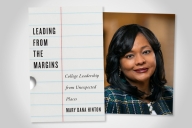You have /5 articles left.
Sign up for a free account or log in.
For many students, living in a college town is a key part of their undergraduate experience. And for many faculty members and administrators, living in a college town is a key part of their adult lives. The University of Massachusetts Press is about to publish a scholarly analysis of these locales, The American College Town. Blake Gumprecht, the author and associate professor of geography at the University of New Hampshire, responded to e-mail questions about his new book.
Q: Many people who live in college towns think about them sociologically or politically or culturally. What drew you to this topic as a geographer?
A: As a geographer, I am most interested in places -- what they’re like, how they function, why they exhibit their particular personalities, what they mean to people, how they came to acquire their distinguishing characteristics over time. The college town is a unique type of place, one with a prominent image in American culture, but about which remarkably little has been written. I’ve spent my life in and around college towns, I am drawn to their way of life, so when I discovered no book had ever been written on the subject, I set out to fill that gap.
Q: Do you think college towns differ significantly by geography? Is an Amherst, Mass. likely to be very different from an Athens, Ga.?
A: College towns differ more according the type of colleges located in them than they do regionally. Towns with large, research-oriented, flagship state universities, like Amherst or Athens, tend to be more similar to one another than they are to other types of college towns nearby that may house a regional state university, a private college, or a historically black college. Colleges attract faculty and students who reflect their characteristics and those people, in turn, shape the college towns where they live, study, and work. Regional differences do exist, but they are less pronounced. College towns in the Northeast, for example, tend to be more prosperous, cosmopolitan, and liberal than college towns in the South because the regions in which they are located, and from which they draw most of their students, possess those attributes. College towns are also shaped by the urban character of the areas from which they attract students. College towns in states where most people live in cities, and that possess major metropolitan areas, tend to be more sophisticated and dynamic than those in states that are predominantly rural.
Q: You note that many college towns are notably different from their states and surrounding communities. Why is that important?
A: Because that is one of their most fundamental characteristics and part of what makes them interesting. If they were like every place else, why would we care about them? But they’re not. They are cultural islands. They are exceptional places. They behave differently. They function differently. They are youthful. They are highly educated. They are cosmopolitan. They are free-spirited and progressive. They are cauldrons of creativity. They attract people who are drawn by their sense of difference. College towns lend color to the cultural mosaic that is the United States.
Q: College towns have historically been known for locally owned bookstores, the restaurant/pub that has been unique for generations, and so forth. In recent years, many college towns have seen legendary bookstores and music stores close down. Is the college town endangered?
A: No. Although bookstores and record stores have been seriously hurt by the Internet and online retailing, their decline doesn’t mean the end of the college town, only that times change. College towns change with them. In the late 1960s and early 1970s, every college town of a certain sort had a head shop, but most of those went out of business long ago. The demise of those businesses didn’t mean the extinction of the college town. Moreover, many college towns do still possess good independent book and record stores and support them -- stores like Prairie Lights Bookstore in Iowa City or Wuxtry Records in Athens. I would argue that independent book and record stores have a better chance for success in college towns than in other types of places because there are still plenty of people in college towns who prefer such stores over their virtual surrogates.
Q: If you had to design a tour to four college towns to show their variety, which would you pick and why?
A: I would begin my tour in Lawrence, Kansas, a quintessential college town and the one I know best, but also one that exhibits some of the changes college towns are undergoing. I also think it would surprise people who’ve never been to Kansas and so would demonstrate the unusual nature of college towns. We’d then drive to Manhattan, Kansas, home to land-grant Kansas State University, because it illustrates how different college towns with land-grant institutions are from those such as Lawrence that are the site of flagship state universities. From there, we’d take a short trip to Maryville, Missouri, home to Northwest Missouri State University, because it would show that the college town character of cities with regional state universities tends to be muted in comparison to other college towns. Since our tour has focused on Midwestern college towns and has been accomplished entirely by car, we’d head last to Grinnell, Iowa, home to Grinnell College, to see how different a college town with an elite private college is from those with state universities.







.jpg?itok=ShaCesee)
